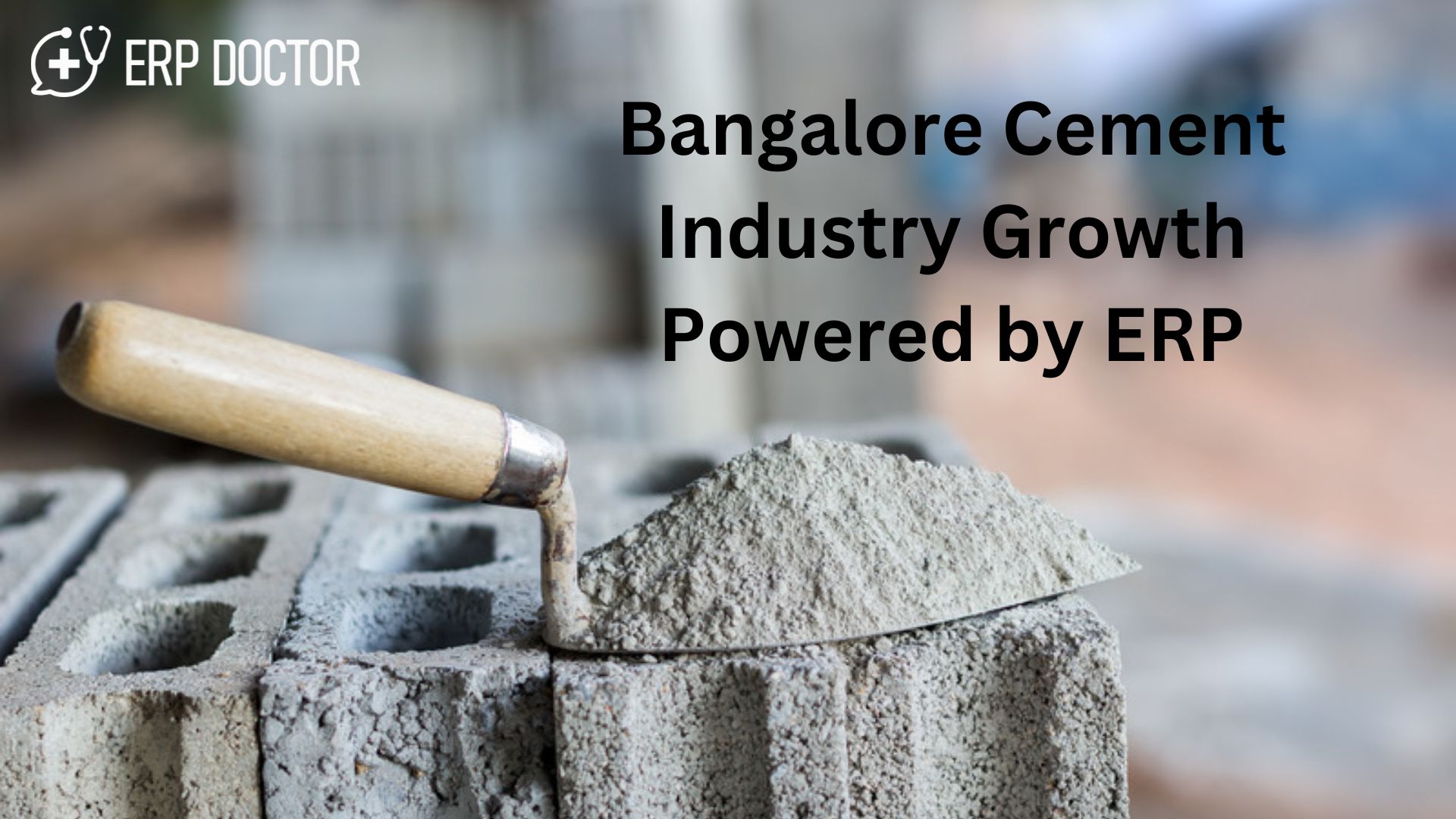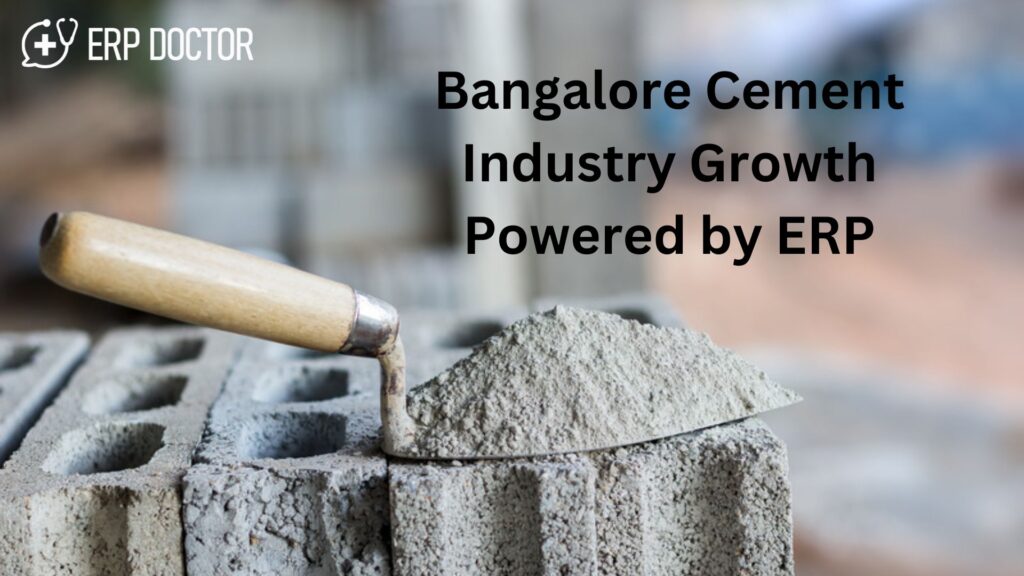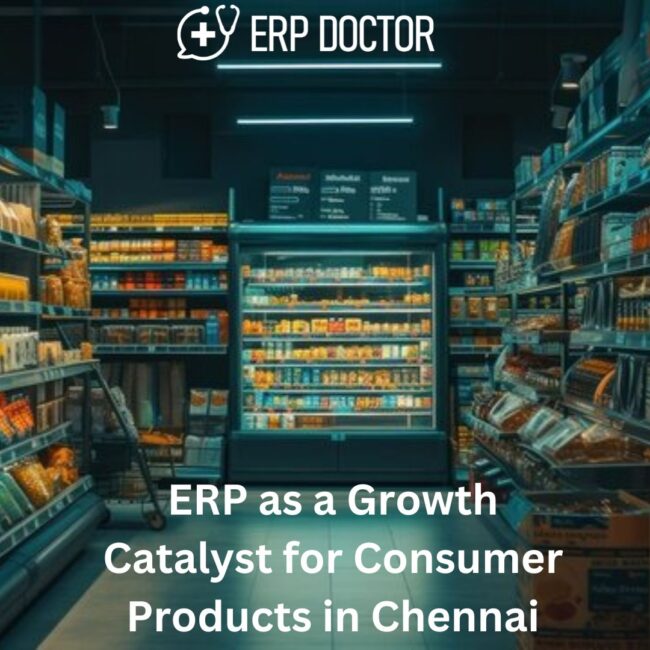
Bangalore Cement Industry Growth Powered by ERP

Cementing Growth: How ERP Systems are Transforming the Bangalore Cement Industry
The cement industry plays a pivotal role in the growth and development of any economy. It provides the essential materials needed for infrastructure development, real estate projects, and other industrial applications. In Bangalore, the cement industry has seen considerable growth over the years, driven by rapid urbanization, infrastructure projects, and the overall demand for construction materials. However, as the industry continues to expand, challenges such as increasing competition, operational inefficiencies, and the need for better resource management have emerged. In this context, Enterprise Resource Planning (ERP) systems have become a game-changer for cement manufacturers in Bangalore. By integrating various business processes into a unified platform, ERP systems help streamline operations, enhance productivity, and drive growth. This blog will explore how ERP systems are helping the Bangalore cement industry flourish and why businesses in the sector should consider adopting these solutions.
Understanding ERP and Its Importance in Cement Industry
Enterprise Resource Planning (ERP) refers to the software used to manage and automate core business processes in an organization, including finance, manufacturing, supply chain, procurement, human resources, and customer relationship management. ERP systems offer a centralized database and real-time insights into business operations, enabling better decision-making, improved efficiency, and enhanced collaboration between departments.
In the cement industry, ERP systems are crucial for optimizing production schedules, managing inventory, improving supply chain processes, and ensuring compliance with industry standards. By integrating all business functions into one platform, cement companies in Bangalore can respond more quickly to market demands, reduce operational costs, and enhance profitability.
ERP for Streamlining Operations in Cement Industry
Cement manufacturing is a complex process that involves multiple stages, including raw material procurement, production, transportation, and distribution. Without proper coordination, it can lead to inefficiencies, delays, and increased costs. ERP systems help streamline operations by automating several key processes and providing real-time data for decision-makers.
For example, in the production process, ERP systems can optimize the use of raw materials, reduce waste, and improve production efficiency. This is particularly beneficial for cement manufacturers in Bangalore, where the industry is characterized by a high level of competition and tight margins. By automating production scheduling, ERP software helps ensure that manufacturing processes are aligned with demand forecasts, reducing downtime and ensuring timely delivery.
Additionally, ERP systems improve inventory management by providing real-time data on stock levels, helping companies reduce excess inventory and avoid stockouts. This leads to cost savings and better resource allocation, which is crucial for cement manufacturers in Bangalore who are constantly looking for ways to stay competitive.
Improved Supply Chain Management with ERP
The cement industry relies heavily on a robust supply chain for sourcing raw materials, distributing finished products, and ensuring timely deliveries. In Bangalore, where infrastructure projects are rapidly growing, the ability to manage the supply chain efficiently is critical to staying competitive.
ERP systems enhance supply chain management by providing a real-time view of supplier performance, inventory levels, and demand forecasts. This enables cement manufacturers to make informed decisions about procurement, production, and distribution. By integrating supplier and customer data into a single system, ERP systems enable seamless communication and reduce the risk of delays or errors in the supply chain.
For example, when managing cement shipments from the production facility to construction sites in Bangalore, ERP systems provide detailed tracking of materials in transit, helping ensure on-time deliveries and reduce transportation costs. Additionally, by improving supplier relationships and ensuring optimal inventory levels, ERP systems help manufacturers avoid stockouts or delays that could affect production timelines.
Cost Reduction and Financial Management with ERP
One of the biggest challenges faced by cement manufacturers in Bangalore is managing costs while ensuring profitability. ERP systems play a significant role in helping companies control costs and optimize financial management. By centralizing all financial data, ERP software provides real-time insights into revenues, expenses, and profit margins.
For cement manufacturers, controlling raw material costs is crucial to maintaining profitability. ERP systems track procurement costs, monitor supplier performance, and ensure that production costs remain within budget. Additionally, ERP solutions allow manufacturers to optimize their energy consumption, reduce waste, and improve overall operational efficiency, leading to cost savings.
Moreover, ERP software helps businesses manage their financial operations more effectively by automating accounting tasks such as invoicing, payroll, and tax compliance. This reduces the risk of errors and ensures that financial processes are completed on time, allowing companies to focus on strategic growth rather than administrative tasks.
Enhanced Decision-Making and Reporting
In today’s fast-paced business environment, the ability to make data-driven decisions is essential for maintaining a competitive edge. ERP systems provide real-time data and comprehensive reports on various aspects of business operations, enabling better decision-making.
For cement manufacturers in Bangalore, having access to real-time production, inventory, and financial data allows management to make informed decisions about production schedules, procurement, and pricing strategies. ERP systems also provide detailed reports on customer demand, supplier performance, and market trends, helping companies identify opportunities for growth and areas for improvement.
By using ERP software to track key performance indicators (KPIs), cement manufacturers can set performance goals, monitor progress, and make adjustments to improve efficiency. This data-driven approach enables companies to stay ahead of competitors and respond quickly to changes in market conditions.
Regulatory Compliance and Sustainability
The cement industry is subject to various regulatory requirements, including environmental standards and safety regulations. ERP systems help cement manufacturers in Bangalore maintain compliance with these regulations by providing tools for tracking emissions, waste management, and worker safety.
For instance, ERP software can automate environmental reporting, ensuring that companies meet local and international sustainability standards. This is particularly important for companies operating in Bangalore, where there is increasing pressure to adopt sustainable practices due to growing concerns about environmental impact.
Additionally, ERP systems help track health and safety metrics, ensuring that manufacturers adhere to workplace safety regulations. By maintaining a strong focus on regulatory compliance, cement manufacturers can reduce the risk of legal penalties and improve their reputation as responsible corporate citizens.
Scalability and Growth Opportunities
As the cement industry in Bangalore continues to expand, businesses need scalable solutions that can grow with them, ERP systems offer the flexibility to scale operations and manage increased production capacity, workforce, and customer base. With the ability to add new modules and features as needed, ERP systems can accommodate the growing demands of cement manufacturers, allowing them to focus on long-term growth strategies.
For example, as a cement manufacturer in Bangalore enters new markets or increases production capacity, ERP systems can be customized to meet the evolving needs of the business. This scalability ensures that manufacturers can continue to grow without worrying about outgrowing their ERP system.
ERP Solutions for Cement Industry
In conclusion, the Bangalore cement industry is experiencing significant growth, and ERP systems are playing a key role in driving this expansion. By streamlining operations, improving supply chain management, reducing costs, and enhancing decision-making, ERP solutions help cement manufacturers stay competitive in a rapidly evolving market. As the industry continues to grow, adopting ERP technology will be crucial for businesses looking to achieve long-term success.
Cement industry in Bangalore that embrace ERP solutions are well-positioned to take advantage of new opportunities, improve operational efficiency, and enhance profitability. By investing in the right ERP system, companies can ensure they have the tools and insights needed to navigate the challenges of the cement industry and achieve sustainable growth.
With ERP solutions for cement Industry, your business can enjoy greater visibility, efficiency, and profitability. Ready to take your energy business to the next level with ERP? Connect with an experienced ERP partner in Bangalore today!
Visit ERP Doctor for Expert Solutions and Support
Want to speak to an expert? Fill in the form below, and we will be in touch with you shortly!







